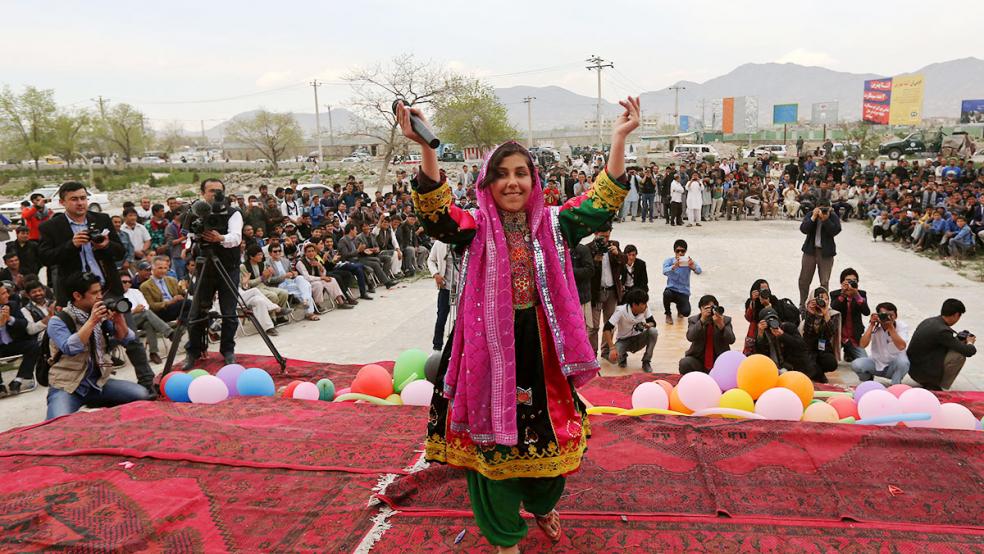Prior to voting for a new Afghan president in early April, there was widespread concern that the election would be a disaster. There were fears of violence by the Taliban. There were concerns that the elections would not be free and fair; the candidates themselves warned of corruption even before the first ballot was cast.
Abdullah Abdullah, one of the candidates, warned of “industrial-scale fraud,” while former finance minister Ashraf Ghani said, “People will not be deprived of their right to good governance."
Related: The Men Shaping America’s Future in Afghanistan
Now, two weeks later, it’s become clear that all of the concerns voiced before the election have turned out to be unfounded. Observers believe the election was free, fair, and largely absent of the widespread corruption that gave current Afghan President Hamid Karzai the office back in 2009.
“Despite the cold and rainy weather and possible terrorist attack, our sisters and brothers nationwide took in this election and their participation is a step forward and it is a success for Afghanistan,” Karzai said following the election.
“It is a great achievement for the Afghan people that so many voters, men and women, young and old, have turned out in such large numbers, despite threats of violence, to have their say in the country's future,” added EU Foreign Secretary William Hague.
The success of the election bodes well for the runoff between frontrunners scheduled for next month. But it also marks one of the rare successes in Afghanistan in recent years.
Related: The U.S. Has Finally Outfoxed Hamid Karzai
For years, Afghanistan seemed doomed. Afghan security forces were poorly trained. Its politics were mired in corruption. The conventional wisdom was that the small gains made by the United States and its allies would be squandered quickly.
The election’s success now gives the international community an opportunity to hope for a new Afghanistan once the majority of American troops leave at the end of the coming summer. Here are three reasons why the elections might portend a brighter future.
1. Elections appear to have been free and fair and were not dominated by male voters. The 2009 election was so corrupt that Abdullah refused to participate in the runoff with Karzai. According to the National Democratic Institute, some 2,842 corruption complaints were filed that year.
This year’s election is a different story. According to Nader Mohseni, spokesman for Afghanistan’s Independent Election Complaints Commission, just 1,573 complaints were filed after this month’s contest.
Related: The Afghan Report That Could Have Saved the US Billions
“Voters throughout the country demonstrated their determination to move the country’s fragile democratic process forward,” the NDI said in a statement.
“Compared with 7.5 million people who voted, that number is very small,” Mohseni told The New York Times after the election.
The 7.5 million voter figure is also impressive. It represents more than 60 percent of registered voters. One-third of all voters were women, an improvement from 2009, when women attempting to vote were harassed and intimidated. (According to NDI, there isn’t sufficient data to determine the female percent of voters in 2009, but all international observers view 2013’s election as a vast improvement from 2009.)
2. The apparent winners are friendly to U.S. interests. No one candidate reached the 50 percent threshold necessary to win outright. The two frontrunners, Abdullah Abdullah and Ashraf Ghani, are likely to face-off again in a runoff next month.
Either candidate would be a big improvement over Karzai. Both have pledged to sign a long-term security agreement to keep U.S. troops in Afghanistan, and both are friendly with the foreign policy community in Washington and in Europe.
3. The Taliban failed to keep people from the polls or disrupt the election with violence. Prior to the election, the Taliban conducted a campaign of violence across the country, raising fears that the election would be a bloodbath for voters. But the long-maligned Afghan security forces proved more competent than anyone believed. They turned back some 286 Taliban attacks, killing 141 while losing only 17 soldiers.
This effectiveness sends the Taliban, as well as the international community, a message of competency. It also gives the Pentagon hope that the vast investments made in these forces is finally paying off.
Top Reads from The Fiscal Times





